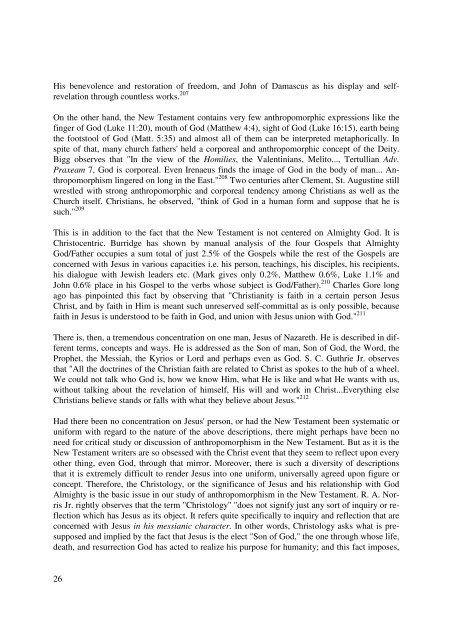Scripture and God in Christianity
Scripture and God in Christianity
Scripture and God in Christianity
Create successful ePaper yourself
Turn your PDF publications into a flip-book with our unique Google optimized e-Paper software.
His benevolence <strong>and</strong> restoration of freedom, <strong>and</strong> John of Damascus as his display <strong>and</strong> selfrevelation<br />
through countless works. 207<br />
On the other h<strong>and</strong>, the New Testament conta<strong>in</strong>s very few anthropomorphic expressions like the<br />
f<strong>in</strong>ger of <strong>God</strong> (Luke 11:20), mouth of <strong>God</strong> (Matthew 4:4), sight of <strong>God</strong> (Luke 16:15), earth be<strong>in</strong>g<br />
the footstool of <strong>God</strong> (Matt. 5:35) <strong>and</strong> almost all of them can be <strong>in</strong>terpreted metaphorically. In<br />
spite of that, many church fathers' held a corporeal <strong>and</strong> anthropomorphic concept of the Deity.<br />
Bigg observes that "In the view of the Homilies, the Valent<strong>in</strong>ians, Melito..., Tertullian Adv.<br />
Praxeam 7, <strong>God</strong> is corporeal. Even Irenaeus f<strong>in</strong>ds the image of <strong>God</strong> <strong>in</strong> the body of man... Anthropomorphism<br />
l<strong>in</strong>gered on long <strong>in</strong> the East." 208 Two centuries after Clement, St. August<strong>in</strong>e still<br />
wrestled with strong anthropomorphic <strong>and</strong> corporeal tendency among Christians as well as the<br />
Church itself. Christians, he observed, "th<strong>in</strong>k of <strong>God</strong> <strong>in</strong> a human form <strong>and</strong> suppose that he is<br />
such." 209<br />
This is <strong>in</strong> addition to the fact that the New Testament is not centered on Almighty <strong>God</strong>. It is<br />
Christocentric. Burridge has shown by manual analysis of the four Gospels that Almighty<br />
<strong>God</strong>/Father occupies a sum total of just 2.5% of the Gospels while the rest of the Gospels are<br />
concerned with Jesus <strong>in</strong> various capacities i.e. his person, teach<strong>in</strong>gs, his disciples, his recipients,<br />
his dialogue with Jewish leaders etc. (Mark gives only 0.2%, Matthew 0.6%, Luke 1.1% <strong>and</strong><br />
John 0.6% place <strong>in</strong> his Gospel to the verbs whose subject is <strong>God</strong>/Father). 210 Charles Gore long<br />
ago has p<strong>in</strong>po<strong>in</strong>ted this fact by observ<strong>in</strong>g that "<strong>Christianity</strong> is faith <strong>in</strong> a certa<strong>in</strong> person Jesus<br />
Christ, <strong>and</strong> by faith <strong>in</strong> Him is meant such unreserved self-committal as is only possible, because<br />
faith <strong>in</strong> Jesus is understood to be faith <strong>in</strong> <strong>God</strong>, <strong>and</strong> union with Jesus union with <strong>God</strong>." 211<br />
There is, then, a tremendous concentration on one man, Jesus of Nazareth. He is described <strong>in</strong> different<br />
terms, concepts <strong>and</strong> ways. He is addressed as the Son of man, Son of <strong>God</strong>, the Word, the<br />
Prophet, the Messiah, the Kyrios or Lord <strong>and</strong> perhaps even as <strong>God</strong>. S. C. Guthrie Jr. observes<br />
that "All the doctr<strong>in</strong>es of the Christian faith are related to Christ as spokes to the hub of a wheel.<br />
We could not talk who <strong>God</strong> is, how we know Him, what He is like <strong>and</strong> what He wants with us,<br />
without talk<strong>in</strong>g about the revelation of himself, His will <strong>and</strong> work <strong>in</strong> Christ...Everyth<strong>in</strong>g else<br />
Christians believe st<strong>and</strong>s or falls with what they believe about Jesus." 212<br />
Had there been no concentration on Jesus' person, or had the New Testament been systematic or<br />
uniform with regard to the nature of the above descriptions, there might perhaps have been no<br />
need for critical study or discussion of anthropomorphism <strong>in</strong> the New Testament. But as it is the<br />
New Testament writers are so obsessed with the Christ event that they seem to reflect upon every<br />
other th<strong>in</strong>g, even <strong>God</strong>, through that mirror. Moreover, there is such a diversity of descriptions<br />
that it is extremely difficult to render Jesus <strong>in</strong>to one uniform, universally agreed upon figure or<br />
concept. Therefore, the Christology, or the significance of Jesus <strong>and</strong> his relationship with <strong>God</strong><br />
Almighty is the basic issue <strong>in</strong> our study of anthropomorphism <strong>in</strong> the New Testament. R. A. Norris<br />
Jr. rightly observes that the term "Christology" "does not signify just any sort of <strong>in</strong>quiry or reflection<br />
which has Jesus as its object. It refers quite specifically to <strong>in</strong>quiry <strong>and</strong> reflection that are<br />
concerned with Jesus <strong>in</strong> his messianic character. In other words, Christology asks what is presupposed<br />
<strong>and</strong> implied by the fact that Jesus is the elect "Son of <strong>God</strong>," the one through whose life,<br />
death, <strong>and</strong> resurrection <strong>God</strong> has acted to realize his purpose for humanity; <strong>and</strong> this fact imposes,<br />
26
















